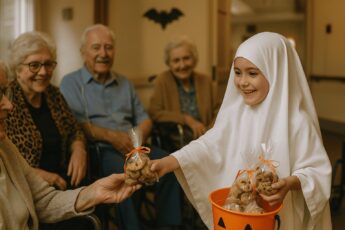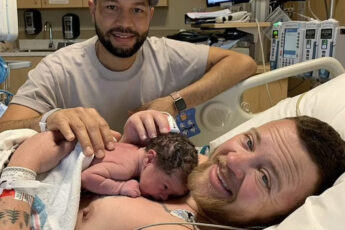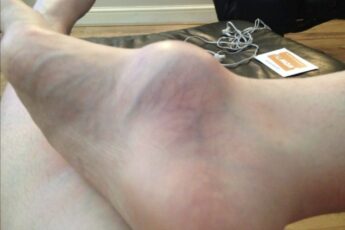At seventeen, Sophie believed she already knew what heartbreak felt like. She thought she understood rejection, shame, the heavy ache of being unwanted. But nothing — not even the foster homes, not even the whispers behind her back — prepared her for the night her adoptive parents pushed her out into the freezing dark for carrying a child.
One moment, she stood in the kitchen, her trembling hands clutching the thin plastic stick that confirmed what her body already knew. The next, her adoptive mother’s voice cut through the air like a blade: cruel words about sin, disgrace, and disappointment. Her father wouldn’t even meet her eyes. The last sound she heard in that house was the slam of the door locking behind her — shutting her out of the only family she had.
All she had left was fifty-six dollars, a backpack of clothes, and a fragile life blooming inside her.
Help came in the unlikeliest form — a woman named Rosa. A stranger with warm eyes, flour-dusted hands, and a floral apron who spotted Sophie shivering on a park bench.
“You need work?” Rosa asked. “I’ve got some. And a roof. But nothing comes free. You’ll work hard. You’ll raise your baby yourself. Deal?”
It wasn’t pity. It wasn’t charity. It was a lifeline — and Sophie clung to it with everything she had.
Months later, her son arrived. Daniel. Tiny, pink, and impossibly perfect. Sophie loved him so fiercely it terrified her. But the exhaustion was endless. Every night was a blur of half-slept hours, bottles, diapers, the thin cries that split her chest in two.
Until one morning.
Sunlight spilled across her face, warm and golden. Silence filled the room. No crying. No fussing.
Heart pounding, Sophie leapt from bed. She ran to the crib. Daniel was there, sleeping soundly, his tiny fists curled under his chin. His diaper was fresh. The bottle she had left ready for the midnight feeding — empty.
Her blood ran cold. She had no memory of getting up.
The next night, the same thing. And the night after that. By the third morning, dread knotted in her chest. Was she sleepwalking? Losing pieces of herself?
That night, Sophie decided she would catch herself in the act. She sat awake in the dark, her eyes burning, every nerve screaming with exhaustion but refusing to let her body give in.
The house was still. Hours crawled by.
And then she heard it.
Footsteps. Slow. Careful. Deliberate. Moving across the floorboards toward Daniel’s room.
Sophie’s breath froze in her throat.
And in that instant, she knew the truth: she wasn’t alone.
Sophie rose slowly from the couch, her legs shaking, every instinct in her body screaming to protect her child. The footsteps were getting closer. The creak of the nursery door.
She grabbed the nearest thing she could find — a heavy lamp from the side table — and stepped into the hallway.
There, half-shrouded in the pale glow of the moonlight, stood a figure bending over Daniel’s crib. A shadow moving with impossible gentleness, tucking the blanket, brushing a strand of hair from the baby’s tiny forehead.
“Stop!” Sophie’s voice cracked like glass. The lamp trembled in her hands.
The figure froze. Slowly, so slowly, it turned.
And Sophie’s heart nearly gave out.
It wasn’t a stranger.
It was Rosa.
Her apron was gone, replaced by a simple nightgown. In her arms, she held Daniel, who stirred faintly before sighing back into sleep. Rosa’s face was lined with something Sophie had never seen before — sorrow. Deep and unending sorrow.
“Rosa…” Sophie’s voice faltered. “Why? Why are you in here?”
Rosa lowered her gaze, her voice hushed.
“My daughter was seventeen, too,” she whispered. “She had a baby. And she didn’t make it through the birth. I never even got to hold him… my grandson. They buried her, and took the baby away. I don’t even know where he is now.”
Tears shimmered in her tired eyes.
“When I saw you on that bench, Sophie… you reminded me of her. So lost. So young. And when Daniel was born, I thought—maybe this is God’s way of giving me a second chance. Not to take him from you… no, never. But to love him, to help him. To be the hands that carry some of the weight when you’re too tired to breathe.”
The lamp slipped from Sophie’s hands and landed softly on the carpet. Her throat ached, her chest heaving.
All the anger, the terror, melted into something else — grief and gratitude tangled together.
She walked to Rosa, reached out, and together they laid Daniel back in his crib. The baby stirred, then settled again, his small body wrapped in warmth and safety.
For a long moment, the two women just stood there, side by side, watching him sleep.
Finally, Sophie whispered, “If you wanted to help… you could have just told me.”
Rosa smiled faintly, brokenly. “Mothers like us… sometimes we forget how to ask. We just do.”
Sophie nodded. And for the first time since being cast out of her adoptive home, she felt it — not charity, not pity. Family.
She reached for Rosa’s hand and squeezed it.
“Then let’s do it together,” Sophie said. “For him.”
And under the soft glow of dawn, as Daniel dreamed peacefully, two women stood guard — one young, one weathered, both scarred — bound not by blood, but by the fierce, unyielding love of mothers who refused to let their children grow up unloved.







